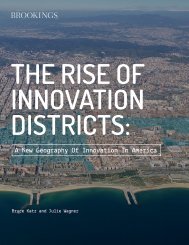TECHNOLOGY AT WORK
1Oclobi
1Oclobi
Create successful ePaper yourself
Turn your PDF publications into a flip-book with our unique Google optimized e-Paper software.
February 2015<br />
Citi GPS: Global Perspectives & Solutions<br />
63<br />
Entirely new occupations and industries are<br />
being created as a result of digital<br />
technology<br />
Technology and New Work<br />
Digital technologies do not only destroy jobs, but also create jobs in entirely new<br />
occupations and industries. For example, computer technology has recently given<br />
rise to many new occupations, such as database administrators and web designers.<br />
Beyond computer-related jobs, occupations such as that of the radiation therapist<br />
similarly underwent significant changes, following the arrival of new technologies.<br />
After the first magnetic resonance imaging (MRI) machine was patented in 1974,<br />
leading the way for the proliferation of MRI scanning techniques, a new<br />
occupational title emerged: MRI special procedures technologist, operating and<br />
monitoring diagnostic imaging equipment. Indeed, the more than 1,500 new job<br />
titles that appeared in the occupational classifications following the invention of the<br />
PC reflect a pervasive transformation of the world of work. 84<br />
New technologies have also created entirely new industries. Consider the Video<br />
and Audio Streaming industry, which appeared as a new title in 2010, following a<br />
series of recent innovations — in 1999, Apple developed QuickTime, a programme<br />
capable of handling various video formats, and in 2002, Adobe introduced Flash, a<br />
streaming format that is used by YouTube.<br />
The Video and Audio Streaming industry is not an isolated example: Internet news<br />
publishers, Social Networking Services and Internet video broadcast sites are all<br />
new industry titles that are associated with the advent of the World Wide Web. 85<br />
Figure 50. New industries emerging from digitisation<br />
Detailed Industry % of New Industry Titles % of U.S. Employment % with College degree Avg. Wage ($)<br />
Internet publishing and broadcasting and web search portals 85.7% 0.06% 69.6% $ 81,138<br />
Electronic shopping 42.8% 0.08% 49.7% $ 45,372<br />
Data processing, hosting, and related services 32.0% 0.08% 48.0% $ 64,729<br />
Electronic auctions 66.6% 0.01% 52.2% $ 47,257<br />
Source: Berger and Frey (2014b)<br />
However, studies have found that the<br />
number of new jobs created from the arrival<br />
of new technologies throughout the 2000s<br />
has been strikingly small<br />
Although there are a number of measurement problems associated with examining<br />
the share of jobs that stems directly from new technologies, new industry titles that<br />
emerge in official classifications as a result of new technologies becoming available,<br />
at least provide an indication. Thus, a recent study by Thor Berger and Carl Benedikt<br />
Frey used such data to systematically capture employment opportunities created by<br />
new industries of the 2000s in the United States. Their findings are quite revealing.<br />
First, the magnitude of new jobs created from the arrival of new technologies<br />
throughout the 2000s has been strikingly small: in 2010 only about 0.5% of the US<br />
workforce was employed in new industries that did not exist a decade earlier. 86<br />
Second, workers in these industries are substantially better educated than the<br />
average population and earned much higher wages: the average wage for workers<br />
in new industries is more than twice the US median wage. For any given level of<br />
education, workers with a STEM degree are also more likely to work in new<br />
industries.<br />
Jobs created through technological progress<br />
have been largely confined to skilled<br />
workers<br />
Hence, in short, although technological progress continues to create new jobs,<br />
these have largely been confined to skilled workers. Cities and nations with a large<br />
pool of skilled workers have thus benefited disproportionally from recent<br />
technological change.<br />
84 Berger and Frey (2014a).<br />
85 Berger and Frey (2014b).<br />
86 ibid<br />
© 2015 Citigroup










